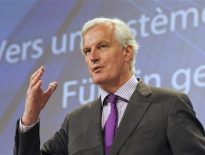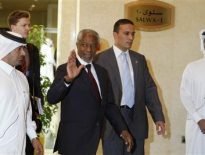(Reuters) – Protesters who had besieged the Wisconsin Capitol in Madison 16 months ago, starting an historic effort to oust Republican Governor Scott Walker from office, said on Tuesday they were demoralized he had survived the recall.

The mood in Wisconsin’s liberal capital city was a far cry from the festive atmosphere a year ago when thousands of people marched in cold to oppose Walker’s efforts to curtail public sector union collective bargaining.
“I think a lot of people are disheartened,” said Lorrie Hurckes, who had supported the Democratic challenger, Milwaukee Mayor Tom Barrett, in Tuesday’s race. “Life goes on. But I don’t feel real optimistic.”
Hundreds of people gathered Tuesday night at venues near the Capitol to watch the election results come in.
When the polls closed, the atmosphere was celebratory. All day long, rumors had swirled among Democratic activists in Madison that voter turnout in inner Milwaukee, especially in African-American neighborhoods, had been huge. Milwaukee and Madison are strongholds of the Democratic party in the state.
The rumors had lifted hopes among Democrats that Barrett, who trailed Walker in the most recent poll, had closed the gap. Their hopes were raised further by early television network exit polls showing the race too close to call.
At the Majestic Theater, disc jockey Nick Nice played records during the television commercial breaks and the bar sold $4 “democracy shots” made with blue Curacao liqueur and citrus vodka. Cheers went up when Barrett or any other well known Democrat was mentioned on TV.
But about an hour after the polls closed, all that changed as one television network after another declared that Walker had won, becoming the first governor in U.S. history to survive a recall vote.
When MSNBC, the cable network with a strong liberal brand popular in Madison, joined the chorus, someone at the “We Are Wisconsin” party at the Concourse Hotel shouted an obscenity at the TV.
“I’m not buying it,” said Ryan Lebica “It’s too early. You’re looking at what will be one of the closest elections in recent years.”
There was also anger directed at the TV networks and other media outlets that called the race while voters in some parts of Milwaukee were still standing in line to cast their ballots, according to the government agency that managers elections.
“People were still voting,” said Russell Novkov, who had spent the day as a volunteer worker at a polling station in the city. “I can’t believe they called the election before everyone got a chance to be heard.”
In fact, Walker won by eight percentage points, a bigger victory than in 2010 when he was first elected governor.
Novkov, who said he regularly participated in anti-Walker protests outside the state capitol, vowed to be back on the protest line Wednesday morning.
But others seemed exhausted by the 16-month-long fight.
“I’m done,” said Mary Swenson, a public school teacher in Madison.
Walker’s union measures required government workers including teachers to pay more for their benefits such as pensions and health insurance, and made paying union dues voluntary. Critics called it “union busting.”
“I’m going home and going to bed,” said Swenson. “I’m not looking forward to seeing my colleagues and kids tomorrow. I’m depressed.”
(Editing by Vicki Allen)





